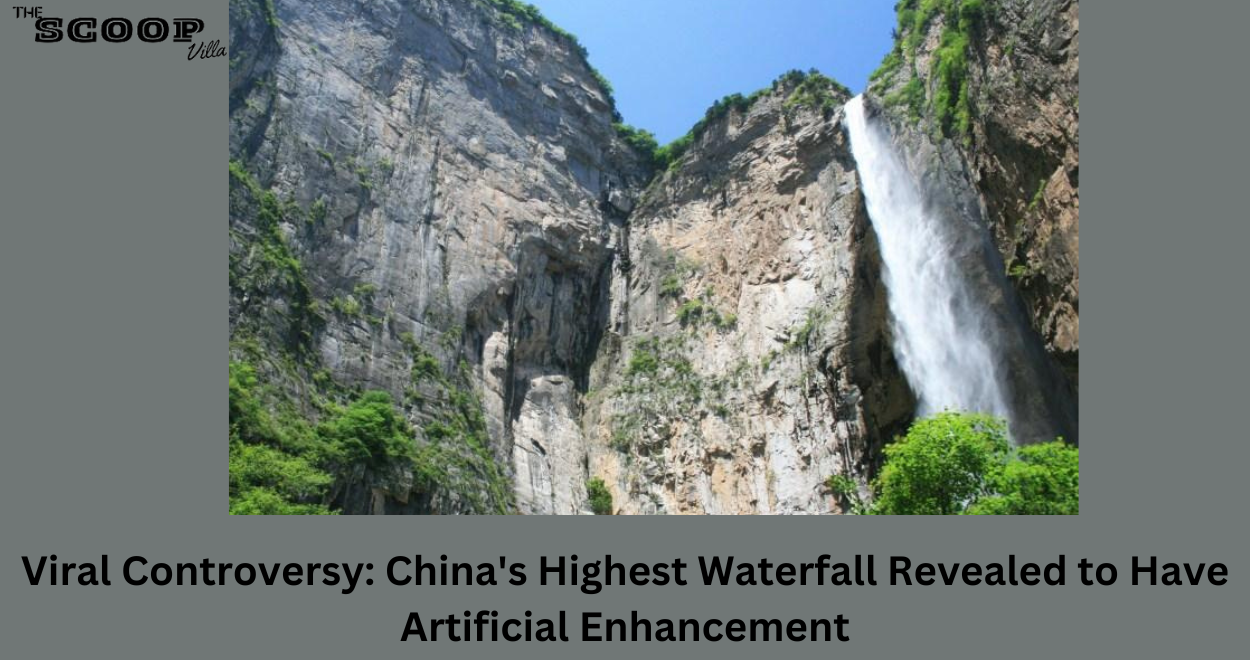The breathtaking Yuntai Sky Fall, renowned as China’s loftiest natural waterfall soaring over 1,000 feet high, has found itself at the center of a viral controversy. A hiker’s video uploaded to Douyin (China’s version of TikTok) exposed an unexpected truth – this celebrated tourist attraction receives an artificial “enhancement” during dry spells.
The Viral Footage
In the viral video, there is a large steel pipe that sprays water into the rock formation which forms the impressive waterfall tourist have come to appreciate. The hiker who came across this setup noted that getting to the source of the waterfall was quite a journey only to reveal a simple pipe.
Operators Come Clean
Challenged by the escalating spread of the video, the management team of the Yuntai Mountain Geopark where the Yuntai Sky Fall is located, acknowledged their ‘small enhancement’. They defended their augmentation of the waterfall during dry seasons as a way of enhancing the experience of visitors who travel long distances only to be disappointed when the waterfall is barely trickling.
Reactions Divide the Internet
This revelation elicited different responses on various social media platforms used in China such as Douyin and Weibo. Some of the netizens explained the situation focusing on the attempt to preserve the spectacle, while the others criticized the lack of transparency calling it a deception of the tourists.
One user said that as long as the management team are willing to work for them that should be enough. Yet, it is worth noting that critics are convinced that the management are just so accustomed to fabricating things, and thus, one cannot help wondering whether it is ethical to make money off an artificial performance.
Legal Implications
According to Article 48 of China’s Tourism Law, tourism operators are required to provide information that is authentic and accurate. The Yuntai Mountain Geopark’s failure to disclose the piped water supply could potentially violate these regulations.
An Unconventional Practice
Source: Image via Douyin
While the artificial enhancement of the Yuntai Sky Fall may seem unusual, supplementing waterfalls during dry seasons is not an unprecedented practice in China. The Tiantai Mountain in Zhejiang province boasts a waterfall that flows on a fixed schedule, having remained dry for 60 years until its 2013 revival.
With over 7 million visitors in the previous year, the Yuntai Mountain Geopark’s decision to augment its star attraction underscores the delicate balance between meeting visitor expectations and maintaining natural authenticity in the tourism industry.
Conclusion
The Yuntai Sky Fall saga raises profound questions about the ethics of enhancing natural wonders and the transparency owed to tourists. While some may view the waterfall’s artificial boost as an innocuous effort to deliver an optimal experience, others will undoubtedly perceive it as a breach of trust. As the video continues ricocheting across social media, this incident has catalyzed a crucial dialogue. Where should lines be drawn between reality and spectacle? How can tourism authorities uphold authenticity while accommodating visitor expectations? The reverberations of this viral controversy seem primed to reshape industry practices and public perspectives on scenic enhancements.
FAQs
Q1: How did the geopark operators respond?
A: The operators acknowledged using supplemental water from pipes to “enhance” the waterfall during dry periods to prevent disappointing tourists.
Q2: What were the main reactions from the public?
A: Reactions were mixed – some understood the effort to deliver a spectacular experience, while others condemned it as deceptive fabrication.
Q3: Is artificially enhancing waterfalls legal in China?
A: China’s Tourism Law requires operators to provide authentic and accurate information, so piping in water without disclosure may violate regulations.
Q4: Is this practice unique to the Yuntai Sky Fall?
A: No, some other sites in China like Tiantai Mountain have waterfalls that only run on fixed schedules after remaining dry for years.
Q5: What are the ethical concerns raised?
A: Key issues include transparency versus deception, profiting from artificial displays, maintaining authenticity of natural attractions, and balancing tourism demands with preservation.
Read more trending posts at TheScoopVilla.
Amit Gupta is a 2016 graduate of Delhi University, India. After working over a decade as an additional writer at TheScoopVilla, he decided to start his own news publication. He mainly focuses on Bollywood News, Hindi and South Indian Movies, Web series articles and editorials. He likes to cooking and play cricket in his free time. Follow On Facebook.

